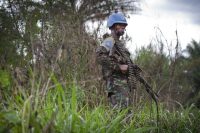
Angolans feel let down two years into new presidency
Two years into his presidency, Angolan leader João Lourenço is treading a difficult course between continuity and radical reform.
Faced with a persistent economic crisis, the new president needs to take bold action to open up the economy to competition and renewed foreign investment, and reduce the country’s dependency on oil.
To do so, he has to loosen the stranglehold of the country’s elites on key sectors of the economy. These are competing networks of interests within the ruling People’s Movement for the Liberation of Angola (MPLA) and the security forces that the previous president, José Eduardo dos Santos, had carefully cultivated in his 38 years in power, by using the country’s vast oil revenues.… Seguir leyendo »




